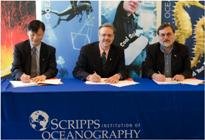German-Californian commitment for the Earth
Five Max Planck Institutes and the Scripps Institution of Oceanography at the University of San Diego cooperate to explore changes in the Earth system.
`It never rains in Southern California` is the title of a famous song by Albert Hammond. Whether even more regions in the world must face a future with less rain and how the Earth system will change, are central topics of a new research collaboration. On June 8th, 2012, five Max Planck Institutes, the Scripps Institute of Oceanography (SIO) and the Department of Physics at the University of San Diego (UCSD) signed a Memorandum of Understanding for long-term cooperation within the Earth system science.

“We are changing the world with increasing speed, so it is time to create synergies in research. We will therefore coordinate our research programs,” said Andreae, who signed the agreement on behalf of the Max Planck Institutes for Biogeochemistry, for Chemistry, for Meteorology, for Dynamics and Self- Organization and for Marine Microbiology. Andreae is also spokesperson of the Earth System Research Partnership of the Max Planck Society.
“This signing formalizes the ongoing and future collaboration of Scripps and the Max Planck Institutes in Earth sciences,” said Lynn Russell. “The combined expertise of both institutions will provide a new path forward to understanding and addressing the complex multidisciplinary problems in climate science.” The atmospheric chemist at Scripps Oceanography was instrumental in bringing scientists from both institutions together to discuss and formalize this collaboration.
Susan Trumbore, director at the Max Planck Institute for Biogeochemistry, expects more exchanges among young researchers. “Training will be at the center of our collaboration. Already this fall, some students and lecturers from San Diego will be participating in a course in Germany,” said the geochemist.
“The rich experience of scientists at the SIO in observing atmosphere and ocean circulations, especially over the Pacific, greatly complements the emphasis on Earth System Modeling at our institute“, added Bjorn Stevens, director at the Max Planck Institute for Meteorology in Hamburg. “We anticipate that this program will provide access for researchers on both continents to some of the most advanced tools available, and the greatest breadth of expertise possible, for understanding our changing climate.”
The German-Californian research agreement SPOCES is based on a long-term cooperation between the institutions, for example in climate studies in the Indian Ocean, and covers the following topics among others:
• The long-term monitoring of greenhouse gas emissions and atmospheric observations of hot-spots of the global change, such as Siberia or the Amazon region.
• The investigation of processes and properties of aerosols and clouds
• The influence of the South Asian Monsoon on atmospheric chemistry and climate
The scientists will not only examine the atmosphere, but all areas of the earth including the oceans and the polar ice. Besides sharing scientific equipment, joint seminars and symposia will be offered, and scientists will be exchanged. Graduate students and postdoctoral scientists of the Max Planck Institutes can apply soon for a research stay in California. Contact persons are the program coordinators Russell and Andreae.
The activities of the SPOCES program will be financed by the participating organizations.
